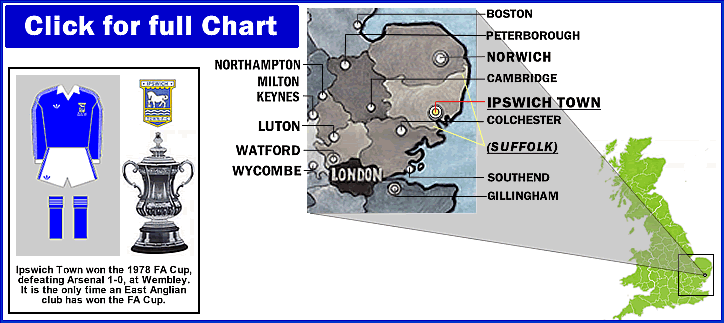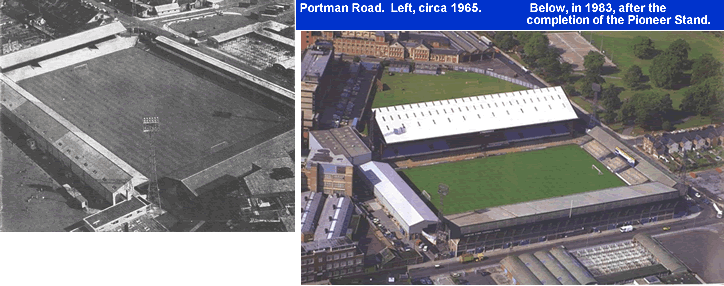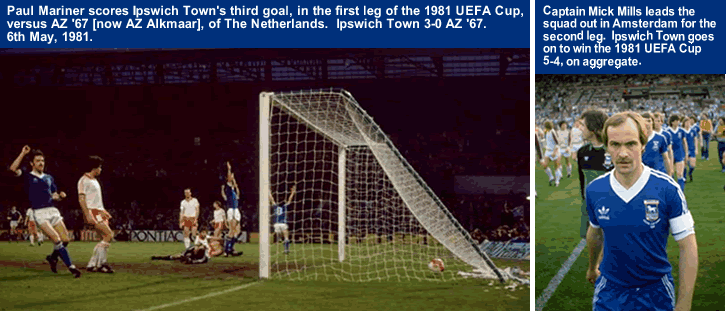Ipswich Town FC was formed in 1888, with the merger of Ipswich Association FC (established 1978), and Ipswich Rugby Club. The club remained steadfastly amatuer for it’s first four decades, only turning pro in 1936. In 1938, the club was elected to the League, joining the Southern League (which is today the equivalent of the 3rd level).
Ipswich Town were first promoted to the Second Division in 1954, but went right back down the next spring. In August, 1955, Alf Ramsay took over the club as manager; the team improved to 3rd place, and the following season (1956-’57) the club returned to the second tier. Four years later, in 1961, Ipswich Town were promoted to the First Division for the first time. The following season, they stunned English football by winning the 1962 National Title. They are the second-to-last club to have won the Title the first year after promotion (Nottingham Forest did it last, in 1977-’78). The fluke-like nature of this championship can be emphasized by the club’s 17th place finish the following season (1962-’63). That same spring, Alf Ramsay left Ipswich to take over the management of the English National team. The following year (1964) Ipswich Town were relegated.
Four seasons later (1968), Ipswich Town were promoted back to the First Division under Bill McGarry. He left to manage Wolverhampton the following year, and was replaced by Bobby Robson. Robson would manage Ipswich Town from 1969 to 1982, leading the club to an FA Cup victory, in 1978, and a UEFA Cup, in 1981.
The club would remain in the top flight for 18 seasons, finishing in 2nd place twice (1980, and ’81), 3rd place three times, and 4th place twice. Robson’s Ipswich teams played a fluid, attacking style of football, led by prolific striker Paul Mariner (22 goals in ’77-’78), all-time fan favorite John Wark (a tough, attacking midfielder, who had 3 spells at the club; see this), and Dutch midfielder Arnold Muhren {see this}. This squad was bolstered in the back by captain Mick Mills (most Ipswich Town appearances, with 591), England international Terry Butcher, and Scottish international George Burley.
**{See these highlights of Ipswich Town’s 1981 UEFA Cup victory.}
**{See this Ipswich Town tribute.}
Ipswich Town regularly drew in the mid 20,000′s in attendance through the mid 1970′s, peaking at a 26,672 average gate, in 1976-’77. But by 1997, the club was only drawing around 12,000. Crowds came back, and have recently peaked at 25,651, in 2004-’05 (when the club finished 3rd in the second level).
Following Robson’s departure in 1982, Ipswich Town slid gradually down the table, and were relegated to the second level, in 1986. Since then, the club has had two short spells in the top flight, the last from 2000 to 2002, when George Burley was manager.
Under current manager Jim Magilton, Ipswich Town still plays the attractive passing game that Robson developed. Their top scorers this season are Spaniard Pablo Counago (back for his second spell with the club), and former Irish under-21 forward Jonathan Walters, with 10 league goals each. Irish international Alan Lee has 9.
This season, the Tractor boys are still unbeaten at home, in the league. The club jumped up 4 places to 6th, on Saturday, beating Sheffield Wednesday 1-2. It was their first away win of the season, and has put them in the playoff places. Goals were scored by Alan Quinn (against his former club), and Alan Lee, in the 71st minute. Click here, for report on the game.
Thanks to Historical Football Kits (historicalkits[dot]co[dot]uk): the 6 older kits on the bottom, left are copyright Historical Kits , and are reproduced by permission. Thanks to the Colours Of Football website (colours-of-football[dot]com). Thanks to the Pride of Anglia website (tmwmtt[dot]com). Thanks to (viewimages[dot]com). Thanks to BBC. Thanks to Tim’s 92 site.



